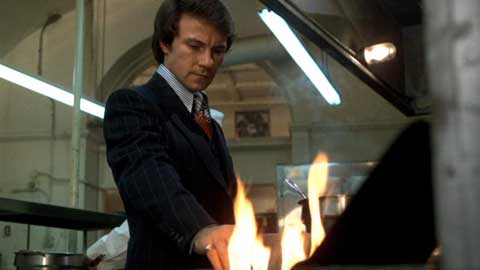Mean Streets (1973)

One of the main themes in Martin Scorsese’s breakthrough film, Mean Streets, is that paying for your sins isn’t done in the confession booth — it’s done right in the streets — what goes around comes around for your transgressions. While Francis Ford Coppola would make the world of the Mafia into two of the biggest epic stories of the early 1970s, The Godfather and The Godfather Part II, Scorsese concentrated on the smaller criminals, like the ones he would find around the neighborhood, who traversed a fine line between respectable endeavors and making an extra buck running numbers and such.
Scorsese (Taxi Driver, New York New York) borrows a good deal just from the characters he would meet in life around the neighborhood of ‘Little Italy’ in the borough of lower Manhattan, New York. Most of the story is told through the eyes of Charlie (Keitel, Mother Jugs & Speed), who is stuck between getting swallowed up into a life of crime along with his high-rolling uncle and syndicate boss Giovanni (Danova, Animal House), and trying to keep his nose clean when everyone is dipping into a piece of the pie around him. Staying on the path of the straight and narrow proves to be a herculean task, especially as he finds himself vouching constantly for his hedonist ne’er-do-well friend Johnny Boy (De Niro, The Deer Hunter), the cousin of his current flame Teresa (Robinson), who, in addition to borrowing a good deal of money around the neighborhood he has neither the means nor desire to pay back, appears to have a screw loose in his dealings with others much more powerful than him.
Although a quintessential New York picture like Scorsese would make throughout his career, much of the film is actually shot in Los Angeles, about as far removed as one gets in the U.S. from the streets that Scorsese, as well as co-screenwriter Mardik Martin (The Last Waltz, Raging Bull), and the characters depicted in the film, grew up on. Scorsese had the unfinished screenplay for many years, then entitled, “Season of the Witch”, before finally hashing it out when it was suggested by John Cassavetes that he do something personal with his next picture. The film would mark the first of many collaborations between Scorsese and Robert De Niro, and to a lesser extent, Harvey Keitel. It would also embark the filmmaker on a journey to showcase such themes that express his Catholic upbringing, especially in his delving into such areas as how crime reaps sin, guilt, fear, and retribution — as well as trying to live by an alternate moral code that works for people living underneath the laws of the land.
As with many of Scorsese’s best, Mean Streets is fueled by a popular soundtrack of hits, both oldies (aka, ‘Mob Hits’) and classic rock tunes, reportedly taken from Scorsese’s own collection. It is said that about half of the budget for the film would come from trying to secure rights for the plethora of songs used throughout the film as a running soundtrack. Scorsese films the neighborhood with darker shades, imbuing the place with a claustrophobia and bleakness that give a tinge of a Hellish existence for its residents (Scorsese shows his brilliance in this regard, such as one scene metaphorically has Keitel reaching out to stick his hand in a flame, exhibiting how close to the fire he is getting through his actions). Temptation and desire lurk, such as the African American stripper Charlie becomes infatuated with, though he knows that it’s a line he isn’t allowed to cross — not in this neighborhood. Such is the life he was born into, and such are the shackles he wishes he could be free from.
For Scorsese fans, it’s a must, as well as for those interested in the important cinema of the 1970s. Though Scorsese has eclipsed, perhaps arguably, Mean Streets in terms of great films, especially in his other big gangster opus, GoodFellas, as he is involved in the writing of the screenplay, it remains one of his most personal films, and one through which we can gain some keen insights as to the things the man himself finds passionate about people, their stories, and New York in general. It’s a bleak film about people born into what they are, with escape always within their grasp, and once they think they have a taste for something different, those mean streets swallow them up whole again.
Qwipster’s rating: A+
MPAA rated R for nudity, violence, a scene of drug use and strong language
Running time: 112 min.
Cast: Harvey Keitel, Robert De Niro, Amy Robinson, Richard Romanus, David Proval, Cesare Danova, Victor Argo, Martin Scorsese
Small role: David Carradine, Robert Carradine
Director: Martin Scorsese
Screenplay: Martin Scorsese, Mardik Martin
